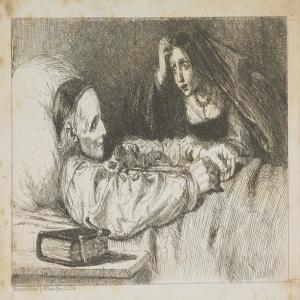
.jpg)
You know... There are moments when time slows down—not because the clock stops, but because something sacred is unfolding.
Kunjamma Chechi's voice trembled when she said it: "Theyyamma Chechi is on her deathbed." Ammachi – the way we call our mother fondly- had just stepped onto the veranda of our house, her body tired due to the work at the spinning mill, her soul still spinning with the rhythm of the day. She didn't panic. She didn't cry. She simply said, "I'll finish my chores quickly and come. Wait for my call—we'll go together."
There's a path behind Valya-valyamma's (the eldest sister of my mother) house. If you walk it, it leads to the paddy fields. On the way, you'll pass a small pond—Pullikkulam. That's where the Pullikkulangara family lived. That's where Theyyamma, the matriarch of the household, lay waiting. Not for healing. For release.
That afternoon, the priest came. He didn't preach. He didn't linger. He anointed her with the final sacrament and left quietly. It was as if he knew: this was no longer a battle to be fought, but a surrender to be embraced.
By evening, Ammachi and Kunjamma Chechi were ready. Draped in thin towels over their shoulders, they walked together. I, just eight years young, followed. We entered the house. The courtyard was dung-smeared, the air thick with silence. A single kerosene lamp flickered in the corner—its flame fragile, like the breath of a soul preparing to leave.
Near the cot, the daughters-in-law whispered the "chevittormma": "Eesho Mariyam Ousephe, ee aalmavinu koottayirikkename..." (Jesus, Mary, and Joseph—be with this soul).
It's said that in the final moments, when darkness tries to pull the heart into despair, these names—spoken softly—become anchors of hope. Not just words, but Shields. Bridges. Light.
The grandchildren sat close, offering water to her lips. When she could no longer swallow, they moistened her mouth with a cloth. Her face was calm. Serene. As if she had already made peace with death. Maybe she had. Perhaps she found comfort in knowing that everyone she loved was nearby.
We stayed until the factory siren cried out at ten. Throughout the night, people came. Not to mourn. To be present. They held her hand. Whispered prayers. Offered silence. They wanted her to know: she was not alone.
The next morning, on our way to Mass, we heard that Theyyamma had passed away. And I thought—what a beautiful death, now when I recall. Not in an ICU. Not tethered to machines. But at home. In love. In light.
I've always believed that death is a blessing. After birth, it is the greatest gift we are given. Think of it—poverty, illness, pride, hatred, lust... all these afflictions cling to the living. Death releases us.
Why fear what is inevitable? Why dread what is divine?
At the moment of death, all the love we've given and received finds its fulfilment. We dissolve into the infinite love of the Divine. Shouldn't we wait for that moment with gratitude?
A hundred years ago, we weren't here. A hundred years from now, we won't be. Why worry?
Perhaps that's what Jesus meant when He said, "Let the dead bury their dead."
I've told my son Akhil about the "chevittormma." He's never heard it whispered into the ear of the dying. I told him: if God grants me a death in bed, let me die at home. And if no one is there to whisper the prayer, play the audio Bible. Marian hymns. Songs of the Holy Mass.
If anyone objects, please inform them that it was my wish. And if they still insist, invite them to sit beside me and whisper the chevittormma together.
That is my desire.
May God's will be done. As the old saying goes, "We plan one thing, but God decides another."
And so, in this month of remembrance—when we honour the souls of the departed and contemplate the mystery of death—these thoughts come not as shadows, but as lanterns.
Lanterns guiding us home...